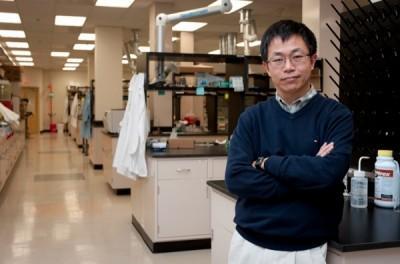 Researcher discovers inexpensive catalyst to produce oxygen and hydrogen gas.
Researcher discovers inexpensive catalyst to produce oxygen and hydrogen gas. (Credit: Kathy F. Atkinson / University of Delaware)
The University of Delaware’s Yushan Yan and his research group synthesized an inexpensive nickel-based catalyst that can split water into oxygen and hydrogen gas.
Nickel, which is cheap and abundant, is an attractive replacement for currently used precious metals.
SEE ALSO: EPFL Scientists Propose Cheaper Hydrogen Production Method
“Cheap and efficient oxidative water splitting is an important piece of the big picture of electrochemical energy conversion because this reaction enables the use of water as an energy source,” Yan says. “But without a catalyst, water splitting is both slow and inefficient. The most successful candidates developed for water oxidation so far have been oxides of ruthenium or iridium, which are both scarce and expensive.”
The work is reported in a paper, “Efficient Water Oxidation Using Nanostructured α-Nickel-Hydroxide as an Electrocatalyst,” published in the Journal of the American Chemical Society (see footnote).
The researchers demonstrated that nickel nanostructures in the form of hollow spheres can catalyze the reaction under conditions that compare favorably to the ruthenium catalyst. Further, the nickel catalyst is much more robust after several cycles of the water-splitting reaction.
“Our approach may lead to a cheaper and more efficient way to create hydrogen to be used for cleaner energy production,” Yan says.
With minor variations, all of the electrochemical devices in Yan’s vision for a combustion-free energy share the same basic three-layer structure: electrode/membrane/electrode.
With price and abundance being critical in the selection of materials for these devices, Yan emphasizes that a major shift is needed in the state of the technology.
“We have to switch from proton exchange membranes, which are acidic, to hydroxide exchange membranes, which are basic, if we want to eliminate the use of precious metals,” he says. “Ultimately, this approach will lead to a new generation of affordable and commercially viable electrochemical systems.”
Gao, M., Sheng, W., Zhuang, Z., Fang, Q., Gu, S., Jiang, J., & Yan, Y. (2014). Efficient Water Oxidation Using Nanostructured α-Nickel-Hydroxide as an Electrocatalyst Journal of the American Chemical Society, 136 (19), 7077-7084 DOI: 10.1021/ja502128j
